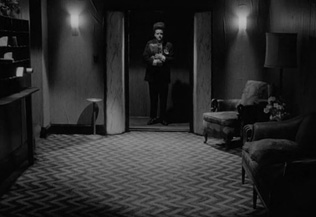|
|
Viking Night: EraserheadBy Bruce HallMarch 29, 2011
This bears repeating: Eraserhead contains the black hideous torment of a thousand nightmares in every frame, and there are few movies you’ll ever see that do a better job of making that so tangible. The film’s imagery quietly pounds at your psyche from the word go. Gnarled trees, twisted pipes, clumps of dirt and shafts of light piercing seas of barren blackness are only occasionally interrupted by gooey giant wiggly things, dancing maggots, and babies so hideous their own mothers don’t love them. The soundtrack is a mash-up of industrial noises, home made effects and eerily disturbing music pushed through a reverb and cut with filters until all that remains is a ghost. Exposure to David Lynch usually leaves you feeling like you’ve been somewhere else, and I think that may be why so many very odd people love his work. There’s an artistry to his films that make you feel engaged when you don’t want to be, and make you watch even though you’d prefer to look away. It’s not something I enjoy experiencing, but if the purpose of a movie is to take you someplace that you’ve never been before, it’s hard to argue that Lynch isn’t a gifted man. Eraserhead is the sort of film I’d only recommend to people who consider themselves students of cinema, or anyone who enjoys being challenged by their entertainment. The purpose of this movie is not to charm you, and it isn’t even interested in scaring you. Eraserhead is the process of one man exorcising some very powerful demons, tearing a page from a diary written in ink from his own soul and splashed onto the screen in a way that forces you to share his terror. It’s amazing, provocative, disgusting, confusing, and everything in between. Whether you like it or not, it is indisputably a true work of art but whether you consider that a gift or a form of torture is up to you. Personally, I consider it both. It’s not exactly cats on a piano, but it’s not something I want to go through on a regular basis, either. On the other hand, the music of Arnold Schoenberg I definitely consider a form of torture. Call me unsophisticated if you want.
|

|
|
|

|
Friday, November 1, 2024
© 2024 Box Office Prophets, a division of One Of Us, Inc.


